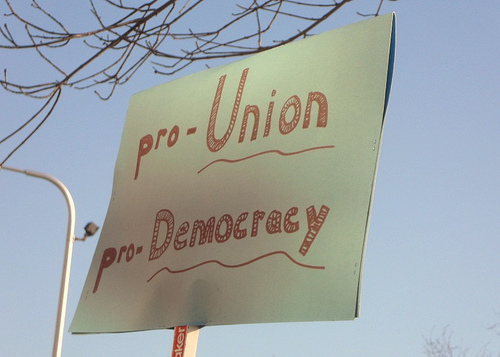Here’s a feel-good story for feel-bad times.
Ordinary working stiff gets fired by Amazon in Staten Island, N.Y. He and his pal, his “co-star” on their “underdog journey”—journalists’ terms—set up “two chairs in a tent” and decide to create a union there which has failed everywhere else. (Except Europe, but that’s another film.) The story of labour’s always been a drama, often a melodrama.
Last week, after two years mainly on their own, they win! If you don’t warm to this, you’re like the doofuses in the Onion’s American Voices: “This is sadder news than when David defeated the mighty and generous Goliath.” They’re getting calls for help from inspired workers worldwide—even Canada!
How did they succeed where others flopped? Basically, they reversed everything that a famous union defeat a year ago at Amazon in Alabama did. (Last week, in a revote, it apparently failed again.)
The huge union that tried down there, the Retail, Wholesale and Department Store Union, didn’t even have a count of employees so they didn’t know how many votes they needed. Instead of building leadership in the plant, they imported celebrities like Danny Glover and Bernie Sanders. This undermines workers’ sense of power and puts the load on outsiders—aside from depriving workers of the sheer delight of standing up to Jeff Bezos themselves. When Amazon said union dues wasted worker’s money, the union said workers don’t have to pay (according to Alabama’s medieval labour laws) instead of justifying dues as a democratic source of power. They even skipped visits to workers’ homes, due to COVID, rather than masking up and making crucial in-person connections. Instead they relied on a “digital strategy.” Imagine challenging Amazon on that playing field!
It’s as though a generation of union leaders (though not including, say, teachers) got institutional amnesia. Many probably never organized a workplace themselves or walked a picket line. Maybe they got their ideas from watching “Norma Rae,” and don’t realize you lose far more often than you win. Then, sometimes, maybe, you win. Maybe the dudes from New York read the critique by wise organizer Jane McAlevey of what went wrong in Alabama; or just drifted down there with eyes open, then went home and did the opposite.
And then, too, there’s the zeitgeist. Never forget the zeitgeist. It often knows more than pollsters and statisticians. So it’s true that just 10 per cent belong to unions in the U.S., half that of the early 1980s; among the young it’s four per cent. Even in the Organization for Economic Co-operation and Development it’s halved since the 1980s. But recent polls show 68 per cent are for unions in the U.S., the highest since 1965. Something’s happening out there.
There’ve been more organizing successes in longtime, union-free places like Starbucks and Uber—along with a sense of approval for it among the public. I don’t know how I know that, but I do. Strikes are being won, like teachers in Minneapolis just now, when in the past there didn’t seem to be any strikes. You wondered if workers and their leaders ever considered going on strike and what it might feel like. Now the recent Liberal-NDP pact in Ottawa includes a ban on scabs in areas under federal regulation. Why would Liberals do that? They may lack a granular set of principles, but they’ve always had a keen sense for the zeitgeist.
Let me end by predicting what will be missing in the inevitable movie. What popular culture like film and TV seems incapable of showing is collective versus individual activities like organizing drives, picket lines or protests. They always look like gangs of extras mimicking what they’ve seen in other movies: moving in robotic circles, etc. They don’t grasp that there’s such a thing as collective process—and I don’t mean mobs. I mean where people unite as equals and even find ways to think together in order to deal with common challenges. Then, when answers emerge, nobody even knows who had them.



